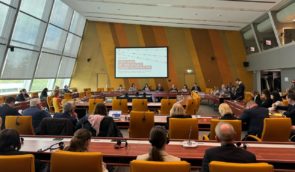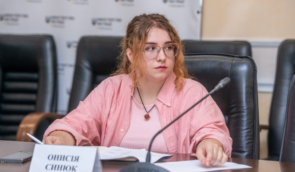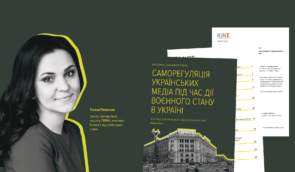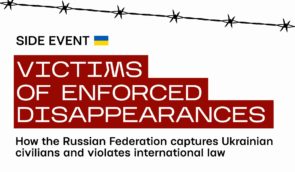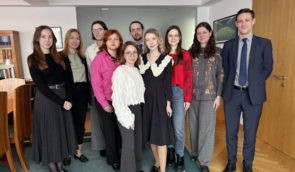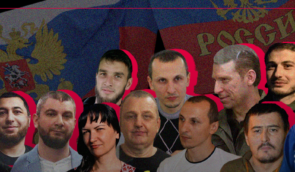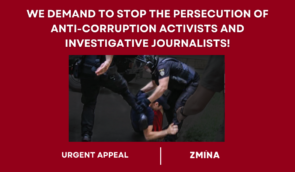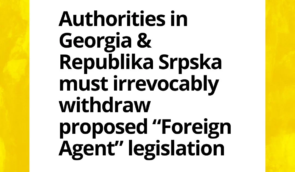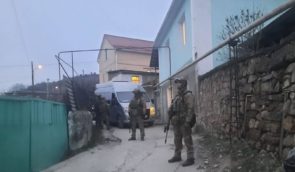Statement by civil society organizations, media and activists on unacceptable restrictions of publicity of trials
The draft law on the reform of judiciary initiated by the President of Ukraine bears a serious threat to transparency of court proceedings. Civil society organizations and activists urge the Parliament to prevent this threat.
After the Revolution of Dignity, the society and the law encouraged courts to become more open and engage in the dialogue with the media and community. The Law “On the Judiciary and Status of Judges” allowed citizens to conduct video or photo recording of public trials without a special permit. It was an important victory despite the fact that many judges were not ready to implement this provision.
However, in June 2017 the President submitted a draft law on the reform of judicial process to the Parliament. The law includes a number of progressive provisions but restricts the principles of publicity and transparency of trials, as well as creates obstacles for exercise of public oversight.
If the law is adopted,
- The court will have the right to BAN photo and video recording or broadcasts of a PUBLIC court hearing if it constitutes an interference with proceedings (article 7(7) of the Civil Procedure Code, article 10(8) of the Administrative Procedure Code, article 9(8) of the Economic Procedure Code according to the draft Law). These amendments can prevent the public from monitoring trials, especially in high profile cases. In fact, this constitutes UNRESTRICTED discretion of the judge when deciding to make the trial closed for the public for arbitrary reasons.
- The court will have the right NOT to let people to the courtroom in a public court hearing if there are “no available places” (article 7(2) of the Civil Procedure Code, article 10(3) of the Administrative Procedure Code, article 9(3) of the Economic Procedure Code according to the draft Law). These provisions will prevent access of the public to judge’s chambers where they often conduct hearings with the sign “Courtroom” on the door. It can also encourage judges to hold hearings in high profile cases in small rooms thus reducing the number of places for the public to avoid public oversight.
- The court will have the right NOT to pronounce judgements publicly in cases where hearings were closed (article 7(18) of the Civil Procedure Code, article 10(17) of the Administrative Procedure Code, article 9(18) of the Economic Procedure Code according to the draft Law). These provisions violate Article 6 of the European Convention on Human Rights which states that judgements shall be pronounced publicly in all cases. For instance, current administrative procedure code is in line with the Convention: judgments in cases with closed hearings shall be pronounced publicly with exception to specific information that the closed hearing was intended to keep undisclosed.
- Participants of proceedings will face liability for violating the BAN on audio or photo recording during a closed meeting with the judge held to settle a dispute (article 204(9), article 149(1)(5) of the Civil Procedure Code, article 186(9), article 149(1)(4) of the Administrative Procedure Code, article 189(10), article 136(1)(5) of the Economic Procedure Code according to the draft Law). With these provisions in place, judges will be able to hold closed meetings with each party and ask for illegal benefits under the guise of dispute settlement without any fear of liability. The parties will not be able to record the conversation or use such record as evidence in court.
These provisions of the draft law are a significant step backwards in the judicial reform as they will prevent public control over the courts and facilitate corruption.
We urge the members of the Ukrainian parliament not to support the draft law no. 6232 on amendments to procedural codes as they include provisions that will make justice untransparent for the public.
Organizations and individuals that have supported the statement
Human Rights Vector NGO and Trial in Simple Words Project
Center for Policy and Legal Reform
Association of Ukrainian Human Rights Monitors on Law Enforcement
Kharkiv Human Rights Protection Group
Human Rights Information Center
Media Initiative for Human Rights
Kharkiv regional foundation “Public Alternative”
Bureau of Legal Communications NGO (Sumy)
DEJURE Foundation
Online media Texty.org.ua
Centre for Democracy and Rule of Law
Open Ukraine NGO
Institute of Mass Information NGO
Luhansk Regional Human Rights Center “Alternative”
Centre for Civil Liberties
All-Ukrainian Association “AutoMaidan” NGO
Open Dialogue Foundation
Human Rights Platform NGO
Larysa Denysenko, Hromadske Radio journalist, human rights activist, lawyer
Elina Shishkina, member of the Parliament of Ukraine, VI convocation, expert of the Reanimation Package of Reforms
Advocacy Advisory Panel NGO
ПІДПИСАТИ
